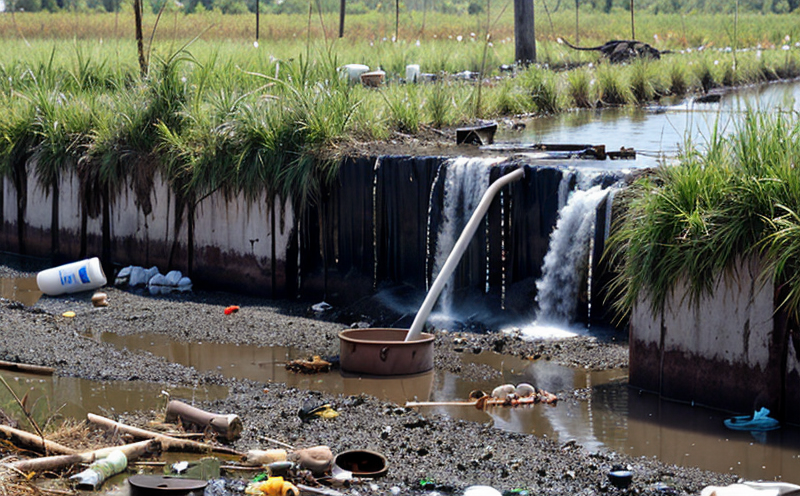Drinking Water Pollutant Testing
The quality of drinking water is a critical concern in maintaining public health and environmental sustainability. Drinking water pollutants can include various contaminants such as heavy metals, pesticides, pharmaceuticals, microorganisms, and organic compounds that may pose risks to human health if present at harmful levels.
Our laboratory specializes in identifying and quantifying these pollutants through comprehensive testing methodologies adhering to international standards like ISO 17025. We utilize advanced analytical instruments including inductively coupled plasma mass spectrometry (ICP-MS), gas chromatography-mass spectrometry (GC-MS), liquid chromatography-tandem mass spectrometry (LC-MS/MS), and microbial detection systems to ensure precise measurements.
For heavy metals such as lead, mercury, cadmium, and arsenic, we follow protocols outlined in ISO 6223:2015 for accurate quantification. The testing process involves water sample collection from the source or distribution system, filtration, digestion if necessary, followed by instrumental analysis to determine concentrations below detection limits specified by regulatory bodies such as EPA (USA) and WHO (World Health Organization).
Pesticides and herbicides are tested using validated methods like those described in ISO 17266 for water. Sample preparation includes extraction techniques that ensure complete removal of the target compounds without interference from other substances present in the matrix.
Pharmaceutical residues, particularly antibiotics and hormones, require highly sensitive analytical approaches due to their low concentrations. We employ LC-MS/MS according to ASTM D7429 for these analyses ensuring minimal cross-reactivity among closely related compounds.
The presence of microorganisms like E. coli, Salmonella, and Cryptosporidium is detected using membrane filtration followed by culture-based or molecular detection methods as specified in ISO 16140-3:2015. This ensures accurate enumeration even at low densities.
Organic compounds including volatile organic compounds (VOCs) are analyzed via GC-MS following EPA Method 8270D guidelines which allow for identification and quantification across a wide range of boiling points and polarities.
The results from our tests provide actionable insights for stakeholders involved in water treatment, distribution systems management, and policy-making. Compliance officers can use these data to ensure adherence to national and international drinking water standards such as NSF/ANSI 60 for materials used in contact with drinking water or WHO guidelines for contaminants.
R&D engineers benefit from our research-oriented testing capabilities which help identify emerging pollutants or potential sources of contamination that could impact future product designs or operational practices. Procurement teams can leverage this information when selecting suppliers or evaluating new technologies related to water treatment and purification processes.
Eurolab Advantages
At Eurolab, our expertise in chemical testing is unmatched. Our state-of-the-art facilities equipped with cutting-edge instrumentation ensure reliable results every time. With over 15 years of experience serving diverse industries including municipal water utilities and private companies, we have built a reputation for excellence.
We offer rapid turnaround times without compromising on accuracy or precision. Our team comprises highly skilled chemists and engineers who understand the nuances of each test method employed. They provide detailed reports complete with raw data and interpretation which help our clients make informed decisions confidently.
Our commitment to quality is reflected not only in our compliance with ISO 17025 but also through continuous improvement initiatives aimed at enhancing our services further. We invest heavily in staff training, new equipment acquisitions, and software updates ensuring that we stay ahead of technological advancements in analytical chemistry.
Why Choose This Test
Testing for pollutants in drinking water is essential not only to comply with regulatory requirements but also to protect public health. Regulatory compliance ensures that the water supply meets stringent safety standards set by governing bodies like EPA and WHO. However, beyond mere compliance, testing helps identify potential risks early on allowing corrective actions to be taken promptly.
By detecting pollutants at their earliest stages, we enable proactive measures such as source water protection strategies which can significantly reduce long-term costs associated with treating more severe forms of contamination later down the line. This approach aligns perfectly with sustainable development goals by promoting resource efficiency and minimizing environmental impact.
The availability of detailed analytical data allows for better decision-making regarding infrastructure investments aimed at improving overall quality. For instance, understanding specific pollutant loads helps prioritize capital expenditure on advanced filtration technologies or alternative sources ensuring long-term reliability of the supply chain.
Environmental and Sustainability Contributions
The importance of clean drinking water cannot be overstated in today’s world where population growth and urbanization place increasing demands on existing resources. By providing reliable pollutant testing services, Eurolab plays a crucial role in safeguarding these vital supplies.
Our efforts contribute directly towards achieving United Nations Sustainable Development Goal 6: Ensure availability and sustainable management of water and sanitation for all. Through early detection of pollutants, we assist municipalities in implementing effective mitigation measures that protect ecosystems while enhancing human well-being.
The data generated from our tests also supports broader environmental initiatives by informing policy decisions at local, national, and international levels. For example, collaborative projects between governments and non-governmental organizations often rely on accurate testing results to design programs aimed at reducing pollution sources upstream or downstream of the water treatment plants.
Moreover, our commitment to sustainability extends beyond just the services provided; it encompasses operational practices within Eurolab itself. We strive for energy efficiency in laboratory operations, minimize waste generation through proper disposal methods, and promote circular economy principles wherever possible. By doing so, we set an example that others can follow towards creating a more sustainable future.





